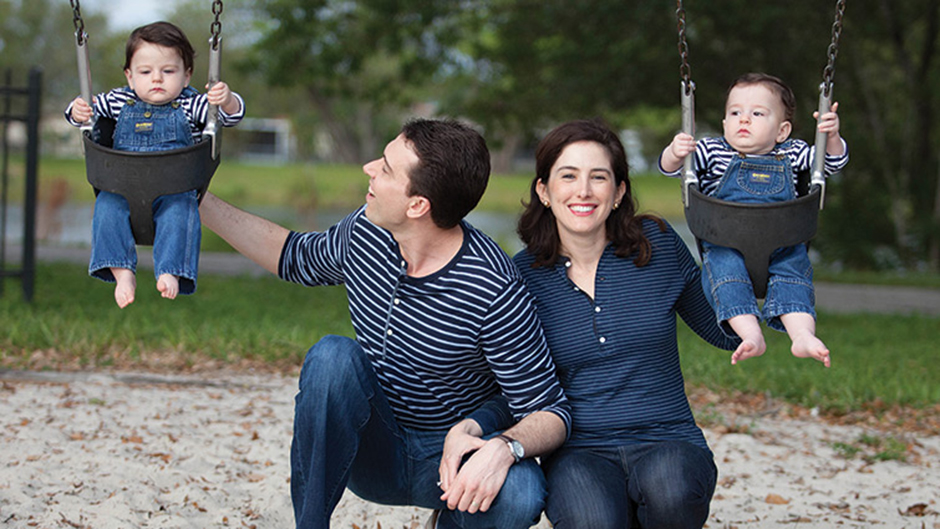Attorney Marla Somerstein Neufeld, J.D. ’07, understands the personal and the legal issues facing couples who find it difficult to start a family. For four years, she and her husband Jason tried pills, inseminations, and In Vitro Fertilization, before engaging a gestational surrogate. Today, Neufeld is the proud mother of twin sons Ethan and Asher, and the founder of the assisted reproductive technology practice at Greenspoon Marder in Fort Lauderdale.
“I consider it a privilege to provide both emotional and legal support to my clients,” said Neufeld. “Just a few weeks ago, a couple who had been trying to conceive a child for six years became the parents of twins through a surrogacy. This is an incredible option for starting a family, providing you take the right legal steps.”
In her practice, Neufeld represents married couples, individuals, and same-sex couples in Florida who are considering adoption or using a gestational surrogate. In either case, would-be parents need enforceable legal agreements in place to protect their rights.
Under Florida law, the donor of any egg, sperm, or embryo relinquishes all parental rights. But all parties must sign an agreement that covers issues like medical care for the surrogate mother, liability for potential complications, and the rights of the future children.
Florida is considered a surrogacy-friendly state, and more couples are considering this approach to have a potential genetic connection to their child,” said Neufeld. “However, a gestational surrogacy must be a medical necessity for the health of the mother or the child—it’s not something that can be done for personal convenience.”
An early interest in the law
Growing up in Fort Lauderdale, Neufeld became interested in the law at an early age. Her father, Barry Somerstein, J.D. ’76, is a partner at Greenspoon Marder. “I always enjoyed seeing my father at work and felt that a law degree, combined with a business education, would give me a good foundation for a rewarding professional career,” she said.
After high school, Neufeld went to American University in Washington, D.C., where she earned a bachelor’s degree in business. She then returned to Florida, where she worked for a state senator before enrolling at the University of Miami School of Law. “I have always been interested in writing,” says Neufeld, who joined the Inter-American Law Review and contributed articles to The Miami Herald. “I really focused on doing well in school and graduated with honors,” she said.
While in law school, she met her husband. “Since my father and my father-in-law Alan Neufeld, J.D. ’75, are both alumni of the School of Law, they hooded Jason and me at our graduation,” Neufeld said, adding that her younger sister, Elizabeth Somerstein, is also a graduate of the School of Law.
Neufeld joined Greenspoon Marder as an associate and spent five years in transactional law, drafting, reviewing, and negotiating legal documents. Meanwhile, Jason Neufeld became a personal attorney with Neufeld, Kleinberg & Pinkiert, P.A. in Aventura.
While launching their legal careers, the Neufelds also spent four years trying to start a family. But like one of every six U.S. couples of childbearing age, they struggled with infertility. “Eventually, I decided not to subject my body to any more medical procedures,” she said. “So, we began searching for a gestational surrogate.”
Through the services of an agency, the Neufelds were able to find a surrogate, go through medical and psychological screenings, and draw up a contractual agreement, paying the agency and legal fees in the process. “It’s an involved process, and ultimately you have to find a surrogate you can really trust,” she said.
Drawing on her personal experiences, Neufeld convinced her colleagues at Greenspoon Marder to open an assisted reproductive technology practice in the firm’s family law group. “We are the only large Florida firm with this type of practice and now have six attorneys in our group,” Neufeld said.
Now, Neufeld serves as a legal guide for prospective parents considering their options and writes an educational blog, The Reproductive Lawyer, about this evolving field of the law. “When a client calls, I talk about my own process as well as the legal issues,” she says. “I really want to be able to guide people to the right resources and get them thinking about the questions they need to ask themselves.”
For example, a couple considering an egg, sperm, and embryo donation should consider the issues of openness and transparency in drawing up adoption or surrogacy agreements. “Do you want to stay in contact after the birth?” she said. “What if you or your child wants information about the birth parent or about a genetic health conditions in the future? That is just one of the many issues that need to be discussed when drawing up an agreement.”
When not practicing law, Neufeld relishes spending time with her husband and young sons. “Coming home from work and seeing them is a wonderful feeling,” she said. “There’s nothing like being a mom.”

